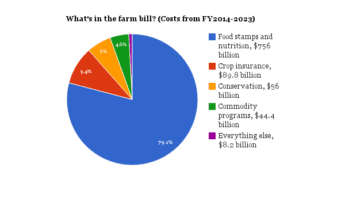Recent media coverage of Prop 37, the California Right to Know Genetically Engineered Food Act, which would permit companies to label foods made with genetically engineered (GE) crops, highlights the gulf between citizens demanding the right to know what's in our food and corporations desperate to keep the public in the dark.
According to the California secretary of state, Monsanto and the rest of the pesticide industry's "Big 6" have contributed $13.5 million so far to defeat this initiative, and have put stopping it at the top of their agenda. Add the money from "Big Food" companies and the opposition funding grows to almost $25 million, with an even bigger "gusher" of corporate cash on its way.
Many of my neighbors are rightly concerned about the possible health harms of eating food made with GE products. Since most of us are already eating the stuff unknowingly, and because we have no independent long-term health studies monitoring the consequences, we have become involuntary participants in a massive uncontrolled experiment. Not a good thing. My concerns, however, go beyond what's on the supermarket shelf.
The dirty little secret behind GE crops is that they are marketing engines for the pesticide industry. Whatever the ads and manipulated media spots say, this is why Monsanto et al. are pulling out all the stops to stop California's labeling initiative.
GE = More Pesticides
Ninety-nine percent of GE crops on the market are engineered to either contain a pesticide or survive being doused with herbicides. This has led to surging herbicide use; contamination of our air, soil, and water; millions of acres of farmland infested with RoundUp-resistant "superweeds" and "superbugs"; and a desperate recourse to older and more toxic pesticides driven by the pesticide companies themselves, and thus, a continuing cycle of pesticide-related illnesses.
This means that every time we buy GE foods, we are also buying into a pesticide-dependent farming system that is poisoning our farmworkers, our family farmers, rural and urban communities alike, our bees, and our environment as a whole.
It's the pesticide treadmill all over again. But this time, GE crops are the turbocharged growth engine for the pesticide industry. No wonder pesticide manufacturers are fiercely opposed to Californians demanding the right to know. And that's not all the Big 6 companies have been up to.
Pushing poisons
Back at the lab, Dow AgroSciences has engineered a new suite of GE seeds (corn, cotton, and soy) to be used with the older and much more toxic herbicide 2,4-D.
2,4-D-resistant corn is a very bad idea. Its introduction into American farmland is expected to drive a 30-fold increase in pesticide use in corn alone. 2,4-D is an herbicide known to be especially toxic to kids. It also drifts off target crops, threatening to damage vulnerable other crops like grapes and tomatoes. Conventional farmers facing crop damage and organic farmers who would lose certification oppose its introduction — but that hasn't stopped Dow.
And that's just the first of the new generation of herbicide-resistant GE crops headed our way. The U.S. Department of Agriculture (USDA) lists 12 new GE products currently in the pipeline for approval, most engineered for use with various combinations of herbicides.
Unraveling democracy
Moving brazenly from selling to the marketplace into rewriting our very laws, industry allies in Congress are threatening sweeping policy changes that would fast-track GE crop approvals. Three riders to the Farm Bill will — if approved — gut the USDA's already weak regulatory process for GE seeds. A fourth rider in the House Agricultural Appropriations Bill would enable USDA to permit continued planting of GE crops, even when a court of law has ruled that such crops were approved illegally.
As House and Senate move to pass a 2012 Farm Bill, these dangerous biotech riders could slip through — unraveling what little regulatory oversight the executive branch of the U.S. government has not yet abrogated, and stripping the last of our democratic checks and balances by rendering the courts essentially moot on this topic. We must be vigilant in defending what remains of our democracy.
Take action » Please join us in urging Congress to stand up to pressure from the Big 6 pesticide corporations, defend our democracy, and reject the pro-GE riders in the Farm Bill.
This blog was originally posted on Maria's Farm Country Kitchen and Huffington Post.








